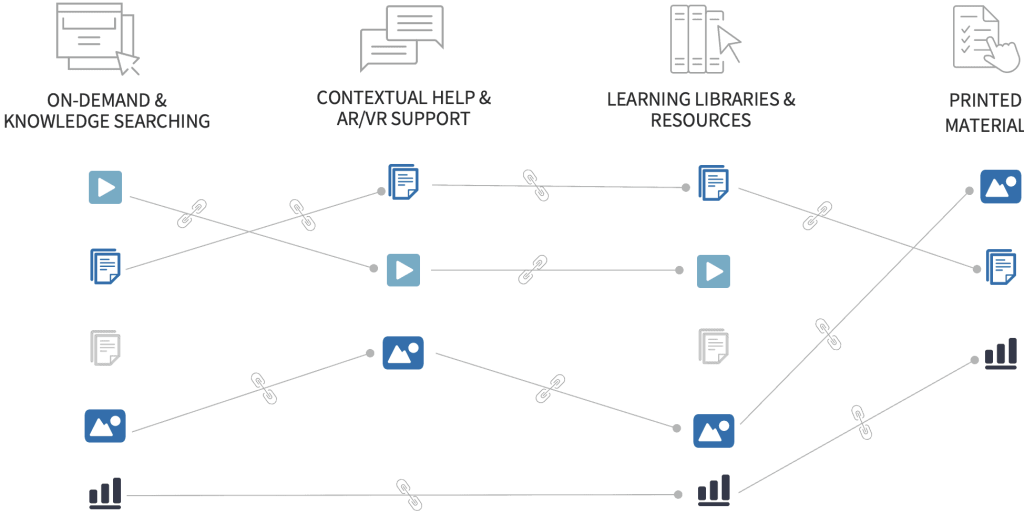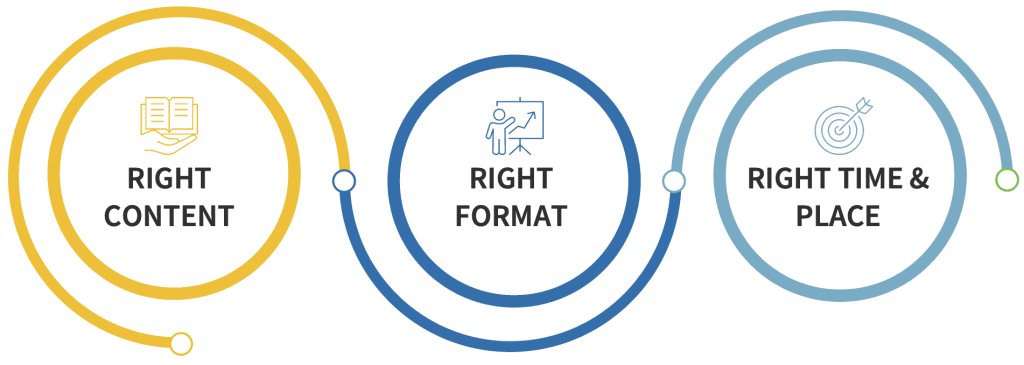Embracing Perpetual Learning: Unlocking Continuous Growth
To stay relevant and competitive, organizations must cultivate an environment that embraces perpetual learning. By making continuous growth a core value, employees are encouraged to be proactive in acquiring new knowledge and skills to adapt to the shifting landscape. Investing in ongoing training and development not only equips individuals with the necessary tools to succeed but also demonstrates that the organization values their personal and professional growth. This commitment to learning creates a sense of loyalty among employees, as they feel supported and motivated to advance their careers within the organization.

Watch this Training Industry webinar, The Secret to Doing More With Less: How to Double Your Content Development Output. Leslie Farinella, Chief Strategy Officer at Xyleme, explains how to double your content development output.
Moreover, perpetual learning promotes a growth mindset, which is the belief that abilities and intelligence can be developed through dedication and hard work. When individuals have a growth mindset, they are more willing to take on new challenges, embrace change, and see setbacks as opportunities for learning and improvement. This mindset fosters a culture of resilience, innovation, and adaptability, contributing to the overall success of the organization.
By fostering a culture of continuous growth, organizations not only empower individuals to adapt and excel in their roles but also create a competitive advantage in a rapidly changing landscape. Embracing perpetual learning becomes a strategic imperative for organizations, as it enables them to stay ahead of industry trends, attract top talent, and drive innovation. Together, organizations and individuals can unlock the full potential of perpetual learning and unlock continuous growth in the face of uncertainty.
Personalization and Creating a Purpose-Driven Environment: Empowering Individuals and Fueling Engagement
Individuals are increasingly seeking tangible evidence of their skills to enhance job security. Personalization and digital credentials provide powerful tools to showcase expertise and empower individuals to continue their development journey. By tailoring learning paths to individual strengths and aspirations and recognizing achievements through digital badges and micro-credentials, organizations can fuel employee satisfaction and engagement while creating a purpose-driven environment.
Personalized professional development plans further enhance individual satisfaction and engagement. When employees understand how their training aligns with their personal and professional goals, they develop a sense of purpose and direction. By tailoring learning paths to individual strengths, aspirations, and areas of improvement, organizations can create a learning environment that nurtures success and growth. Personalization allows employees to focus on areas that matter most to them, ensuring that the training experience is relevant, meaningful, and impactful.

By emphasizing individual well-being and fulfillment in training efforts, organizations foster happier and more engaged employees. Addressing skills gaps in a way that aligns with individual goals and values not only drives personal growth but also contributes to overall job satisfaction. Prioritizing employee growth and well-being creates a positive work environment where individuals feel valued, supported, and motivated to excel.
Optimizing Learning Delivery for Scalability: Efficiency in Providing Relevant Content
To achieve scalability, organizations can harness the power of adaptive learning platforms and scripted learning paths. Adaptive learning platforms utilize intelligent algorithms and data analytics to tailor learning experiences to the unique needs and preferences of individuals. By leveraging these platforms, organizations can create personalized learning journeys that align with each employee's growth objectives. This level of customization not only enhances engagement and motivation but also ensures that individuals receive the knowledge and skills they require to excel in their roles.
Scripted learning paths provide a structured and systematic approach to learning. By breaking down complex topics into smaller, manageable modules, individuals can progress at their own pace, focusing on specific areas of interest or areas where they need additional support. Scripted learning paths also enable organizations to track the progress and performance of learners, allowing for targeted interventions and further optimization of the learning process.
This optimization of learning delivery not only benefits individual learners but also contributes to broader business goals. When employees receive relevant and targeted training, they can acquire the skills and knowledge needed to drive organizational growth and success. By aligning learning content with business objectives, organizations can ensure that the training provided is directly applicable to job tasks and responsibilities. This, in turn, improves employee performance, productivity, and overall organizational efficiency.

Leveraging technology is instrumental in achieving scalability without sacrificing the quality of the learning experience. Technology enables organizations to deliver training content through various digital channels, such as online learning platforms, mobile applications, and virtual classrooms. These digital solutions facilitate anytime, anywhere access to learning materials, allowing employees to engage in training at their convenience. Additionally, technology enables organizations to measure the effectiveness of training programs through data analytics, allowing for continuous improvement and refinement.
Modular Content Development and Mastery: Enhancing Efficiency through Adaptability
A modular approach allows for the creation of adaptable and reusable learning content, resulting in significant efficiency gains. By breaking down learning content into smaller, interconnected modules, creators can build a library of resources that can be customized and combined to meet the diverse needs of learners. This modular approach enables learning experiences to be tailored to individual preferences, learning styles, and proficiency levels. Learners can navigate through the modules based on their specific requirements, ensuring that they receive the most relevant and targeted information to enhance their knowledge and skills.
 The reusability of modular content enhances efficiency by reducing duplication of effort. Creators can design and develop content that can be repurposed across different programs, courses, and learning initiatives. This not only saves time and resources but also ensures consistency in messaging and learning outcomes. Additionally, modular content allows for faster updates and revisions, as changes made to one module can be easily reflected across other relevant modules.
The reusability of modular content enhances efficiency by reducing duplication of effort. Creators can design and develop content that can be repurposed across different programs, courses, and learning initiatives. This not only saves time and resources but also ensures consistency in messaging and learning outcomes. Additionally, modular content allows for faster updates and revisions, as changes made to one module can be easily reflected across other relevant modules.
Data-driven decision-making plays a vital role in optimizing modular content development and delivery. By leveraging analytics, organizations can gain insights into learner behavior, engagement, and performance. This data allows creators to identify areas of improvement and make informed decisions about content development and delivery strategies. Analytics can help identify modules that are highly effective or require further enhancements, enabling continuous improvement and refinement of learning experiences.
Moreover, data-driven decision-making allows organizations to align their learning initiatives with business objectives. By analyzing data on learner performance and skill gaps, organizations can identify critical areas that require development and prioritize content creation accordingly. These insights help ensure that the modular content developed is targeted towards addressing specific organizational needs and drives performance improvement.
In addition to enhancing efficiency, modular content development and mastery foster a culture of continuous learning and skill acquisition. Learners can progress at their own pace, focusing on areas where they need to build mastery or acquire new expertise. The adaptability of modular content allows for personalized learning pathways, enabling individuals to take ownership of their learning journey and achieve mastery in their desired areas.
Transitioning to an Enterprise Strategy: Meeting the Demands of Large-Scale Reskilling
To effectively reskill on a large scale, transitioning from a project-based focus to an enterprise strategy is paramount. Standardizing content and implementing AI and machine learning technologies enable hyper-personalization. Template-driven content creation streamlines quality assurance and branding processes, ensuring consistent and efficient delivery. By adopting an enterprise approach, organizations can leverage their resources more effectively, making the reskilling process more efficient and cost-effective.
The key to achieving more with less lies in maximizing efficiency. By embracing perpetual learning, personalization, and optimizing learning delivery, organizations can navigate the challenges of reskilling and upskilling. Modular content development, fostering purpose-driven environments, and transitioning to an enterprise strategy will revolutionize upskilling efforts. Let's embark on this transformative journey to create a future where individuals thrive in a rapidly evolving business landscape. With the right strategies and tools in place, we can empower individuals to adapt and succeed in the face of technological change.
Our Customers Have Powerful Journeys
Explore our insightful customer stories to see how our solutions have helped organizations like yours achieve tangible results.





